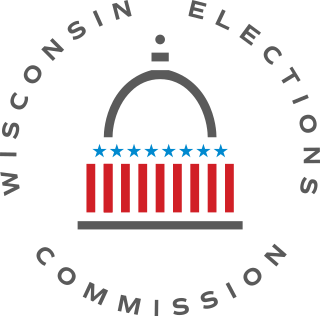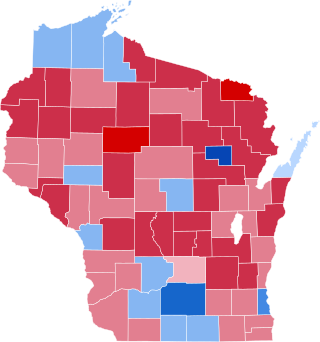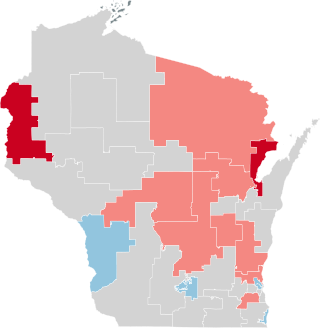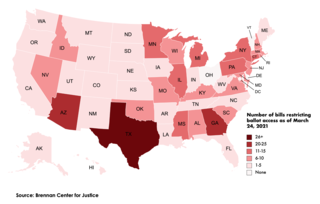Related Research Articles

Hancock County is a county located in the East Central part of the U.S. state of Georgia. As of the 2020 census, the population was 8,735. The county seat is Sparta. The county was created on December 17, 1793, and named for John Hancock, a Founding Father of the American Revolution.
Voter caging is a colloquial term used in the United States referring to a campaign activity used to remove, or attempt to remove, targeted voters from official lists of registered voters. It occurs when a non-governmental organization, such as a political party or a campaign, sends first-class mail to registered voters, in order to compile a so-called "challenge list" of the names of those whose letters are returned undelivered. The fact that the mail was returned as undeliverable may be seen as either proof, or strong evidence of, the person no longer residing at the address on their voter registration. The challenge list is presented to election officials with the suggestion that the officials should purge these names from the voter registration rolls or to challenge voters' eligibility to vote on the grounds that the voters no longer reside at their registered addresses.

Kris William Kobach is an American lawyer and politician who has served as the attorney general of Kansas since 2023. He previously served as the 31st secretary of state of Kansas from 2011 to 2019.

The 2012 United States presidential election in Wisconsin took place on November 6, 2012, as part of the 2012 United States presidential election in which all 50 states plus the District of Columbia participated. Wisconsin voters chose 10 electors to represent them in the Electoral College via a popular vote pitting incumbent Democratic President Barack Obama and his running mate, Vice President Joe Biden, against Republican challenger and former Massachusetts Governor Mitt Romney and his running mate, Congressman Paul Ryan.
Shelby County v. Holder, 570 U.S. 529 (2013), is a landmark decision of the Supreme Court of the United States regarding the constitutionality of two provisions of the Voting Rights Act of 1965: Section 5, which requires certain states and local governments to obtain federal preclearance before implementing any changes to their voting laws or practices; and subsection (b) of Section 4, which contains the coverage formula that determines which jurisdictions are subject to preclearance based on their histories of racial discrimination in voting.
Voter suppression in the United States consists of various legal and illegal efforts to prevent eligible citizens from exercising their right to vote. Such voter suppression efforts vary by state, local government, precinct, and election. Voter suppression has historically been used for racial, economic, gender, age and disability discrimination. After the American Civil War, all African-American men were granted voting rights, but poll taxes or language tests were used to limit and suppress the ability to register or cast a ballot. The Civil Rights Act of 1964 and the Voting Rights Act of 1965 improved voting access. Since the beginning of voter suppression efforts, proponents of these laws have cited concerns over electoral integrity as a justification for various restrictions and requirements, while opponents argue that these constitute bad faith given the lack of voter fraud evidence in the United States.
Robert Brooks is an American businessman and Republican politician from Ozaukee County, Wisconsin. He is a member of the Wisconsin State Assembly, representing Wisconsin's 59th Assembly district since 2025; he previously represented the 60th Assembly district from 2015 to 2025. Earlier in his career, he served on the board of supervisors of Ozaukee County, and was chairman of the board of supervisors from 2004 to 2013.
Brian Keith Hagedorn is an American lawyer and a justice of the Wisconsin Supreme Court, serving since 2019. Prior to his election to the supreme court, he served four years as a judge on the Wisconsin Court of Appeals.

The Wisconsin Elections Commission is a bipartisan regulatory agency of the state of Wisconsin established to administer and enforce election laws in the state. The Wisconsin Elections Commission was established by a 2015 act of the Wisconsin Legislature which also established the Wisconsin Ethics Commission to administer campaign finance, ethics, and lobbying laws. The two commissions began operation on June 30, 2016, replacing the Wisconsin Government Accountability Board (GAB), which was abolished.
The Wisconsin Institute for Law and Liberty (WILL) is a nonprofit conservative law firm based in Milwaukee, Wisconsin. The group was founded by lawyer Rick Esenberg in 2011.
Husted v. A. Philip Randolph Institute, No. 16-980, 584 U.S. ___ (2018), was a case before the Supreme Court of the United States regarding Ohio's voter registration laws. At issue was whether federal law, 52 U.S.C. § 20507, permits Ohio's list-maintenance process, which uses a registered voter's voter inactivity as a reason to send a confirmation notice to that voter under the National Voter Registration Act of 1993 and the Help America Vote Act of 2002. If the mail is not returned, the voter is stricken from the rolls, a practice called voter caging. The Court ruled in a 5–4 decision that Ohio's law did not violate federal laws.
The WOW counties are three counties in the southeast of the U.S. state of Wisconsin: Waukesha, Ozaukee, and Washington. They are to the west, north, and northwest of Milwaukee, respectively, and are part of the Milwaukee metropolitan area.

Fish v. Kobach was a 2018 bench trial in the United States District Court for the District of Kansas in which five Kansas residents, the ACLU and the League of Women Voters contested the legality of the Documentary Proof of Citizenship (DPOC) requirement of the Kansas Secure and Fair Elections (SAFE) Act, which was enacted in 2011 and took effect in 2013.
The Public Interest Legal Foundation (PILF) is an American conservative legal group based in Alexandria, Virginia, which is known for suing states and local governments to purge voters from election rolls. The nonprofit was constituted in 2012.

The 2020 United States presidential election in Wisconsin was held on Tuesday, November 3, 2020, as part of the 2020 United States presidential election in which all 50 states plus the District of Columbia participated. Wisconsin voters chose electors to represent them in the Electoral College via a popular vote, pitting the Republican Party's nominee, incumbent President Donald Trump, and running mate Vice President Mike Pence against Democratic Party nominee, former Vice President Joe Biden, and his running mate California Senator Kamala Harris. Wisconsin has 10 electoral votes in the Electoral College.
Jennifer Elise Nashold is an American attorney, currently serving as a judge of the Wisconsin Court of Appeals. She was elected in 2019.
Paul V. Malloy is the presiding circuit court judge for Ozaukee County, Wisconsin.

The 2020 Wisconsin Senate elections were held on Tuesday, November 3, 2020, at the Fall general election in Wisconsin. 16 of the 33 seats in the Wisconsin Senate were up for election—the even-numbered districts. Before the election, Republicans held 18 seats, Democrats held 13, and two were vacant. Of the seats up for election, seven were held by Republicans, seven were held by Democrats, one was vacated by a Democratic resignation, and one was vacated by a Republican resignation. The primary election was held on August 11, 2020.
In direct response to election changes related to the COVID-19 pandemic and 2020 United States presidential election in Wisconsin; Donald Trump's campaign launched numerous lawsuits contesting the election processes of Wisconsin. All were either dismissed or dropped.

Following the 2020 United States presidential election and the unsuccessful attempts by Donald Trump and various other Republican officials to overturn it, Republican lawmakers initiated a sweeping effort to make voting laws more restrictive within several states across the country. According to the Brennan Center for Justice, as of October 4, 2021, more than 425 bills that would restrict voting access have been introduced in 49 states—with 33 of these bills enacted across 19 states so far. The bills are largely centered around limiting mail-in voting, strengthening voter ID laws, shortening early voting, eliminating automatic and same-day voter registration, curbing the use of ballot drop boxes, and allowing for increased purging of voter rolls. Republicans in at least eight states have also introduced bills that would give lawmakers greater power over election administration after they were unsuccessful in their attempts to overturn election results in swing states won by Democratic candidate Joe Biden in the 2020 election. The efforts garnered press attention and public outrage from Democrats, and by 2023 Republicans had adopted a more "under the radar" approach to achieve their goals.
References
- 1 2 "Opitz, David W. 1945". Wisconsin Historical Society. Archived from the original on October 13, 2013. Retrieved 2013-10-25.
- ↑ Wisconsin Legislative Reference Bureau, ed. (1979). The State of Wisconsin 1979-1980 Blue Book. Madison: Wisconsin Department of Administration. p. 60. Retrieved 2013-10-25.
- ↑ Conservative legal group alleges Elections Commission in contempt of court, Wisconsin State Journal , Riley Vetterkind, January 2, 2020. Retrieved January 3, 2010.
- ↑ Wisconsin judge orders removal of 234,000 voters from state registry, FOX6Now , Amy Dupont, December 13, 2019. Retrieved January 3, 2020.
- 1 2 3 4 Matthew Rothschild: Elections Commission is right to hold off on voter purge, The Cap Times , Matthew Rothschild, December 19, 2019. Retrieved January 3, 2020.
- ↑ Effort to stop removal of 234K voter registrations heads to federal court, while attorney general tries to stall purge in state court, Milwaukee Journal Sentinel, Bruce Vielmetti and Molly Beck, December 17, 2019. Retrieved January 3, 2020.
- ↑ Archived Project Archived 2021-03-08 at the Wayback Machine , Pew Charitable Trust . Retrieved January 3, 2020.
- ↑ Another Use for A.I.: Finding Millions of Unregistered Voters, The New York Times, Steve Lohr, November 5, 2018. Retrieved January 3. 2020.
- ↑ How a Conservative Group Persuaded a Judge to Purge Wisconsin's Voter Rolls, Slate Magazine , Mark Joseph Stern, December 16, 2019. Retrieved January 3, 2020.
- ↑ Vetterkind, Riley (2020-01-02). "Conservative legal group alleges Elections Commission in contempt of court". Wisconsin State Journal . Retrieved 2020-01-03.
- ↑ Leip, David. "Dave Leip's Atlas of U.S. Presidential Elections". uselectionatlas.org. Retrieved January 3, 2020.